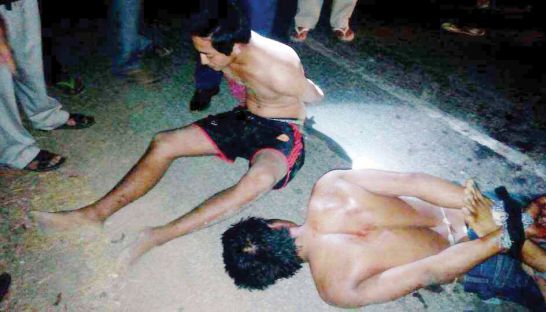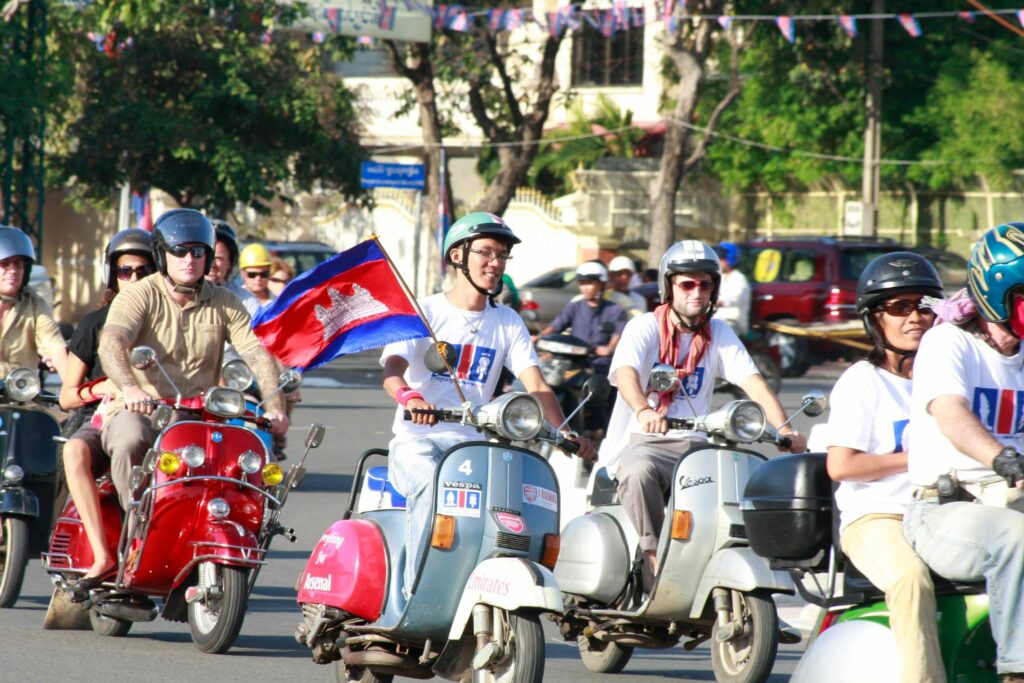Unofficial Translation from The Phnom Penh Post’s Khmer edition
TUESDAY, 31 MARCH 2015,
TONG SOPRACH
ស្រុកខ្មែរសន្តិភាពនៅតែក្នុងក្តីប្រាថ្នាតែកាយវិការមិនជ្រះស្រឡះពីហិង្សា

The word “Peace” has been used by Cambodian politicians and rulers for generations under the illusion that it is synonymous with “the absence of war.” Most Cambodians share the same view of this word. Today, it is synonymous with “Samdach Hun Sen:” we often hear the slogan “Samdach Hun Sen is Peace!”
But is it really peace when there are so many ways to die in Cambodia? “Peace” does not refer only to the freedom from war but also to physical, verbal and emotional tranquility, as well as the freedom from violence and conflict. In general, Cambodian politicians will only act “peacefully” during their campaigns to gain support but tend to do otherwise when they gain the power, they don’t have peace in their mind. Many people will publicly imitate their anger and violent tendency, or worse, kill threaten, probably getting that from the politicians. Sarcastically, some dare to take their own life because they are so “angry” but cannot do anything.
Why has violence become the common trait? There are more ways to die in Cambodia than in the Wild West, so to speak. In the previous week, there were so many cases such as:
– Murder and Torture: Groups of armed robbers had repeatedly burgled jewelries in several provinces and killed people. There were also cases of robbers targeting and killing foreigners, either investors or tourists. Not so many days ago, in Steung Traeng province, a former soldier murdered his ex-wife with five shots after she wouldn’t get back together with him. In Steung Trang district of Kampong Cham, a poor little boy was strangled to death for his small platinum necklace. A jealous lover poured acid liquid on her husband’s paramour; she died from her injuries several days later. On Facebook, images circulated of a young boy tied to the leg of a countryside home and tortured. In Prey Veng province, two drivers were nearly beaten to death by military police.
– Gang Violence: Despite impovements in gun control, gangs are taking to improvised weapons such as axe, knives and swords. The example of such a fight includes the one on Russian Federation Blvd of Phnom Penh heart, in which a young man was slashed to death. Another young man had his head chopped through while eating fried noodles at a street stall near Pochentong. In another case, students found several samurai swords near the Pochentong primary school. In Sihanoukville, two groups of gangsters waged war in the streets, with two corpses found the next morning. In Kampong Chhnang, many were injured in a massive high school brawl.
– Mob Killing: Many people in Cambodia cannot place faith in the police and the court, on fears of extortion and corruption. That leads to what is called “The People’s Court,” in which a mob finds an individual guilty of a crime and beats or kills the convict without further inquiry from the police. In Por Senchey district, a young man was executed in public because he stole a wallet and a smartphone; nobody from the mob was prosecuted. This form of impunity, along with the lack of investigation, fuels further mob killings.
– Drugs: Cambodia could become like Mexico because of its drug crackdowns, carried out all across the country. Police forces and drug cartels have been known to engage in armed shootouts. When you look at a local newspaper in one issue, you will notice at least five criminal reports involving drug abuse and violence, involving both Khmers and internationals.
– Traffic accidents: Traffic crashes are the number one killer in Cambodia, surpassing HIV/Aids and malaria. In one newspaper, there are often more than a dozen reports each day about deadly crashes. Rather than resort to the police, people tend to argue, sometimes leading to brawls. In Cambodia, it is not unusual to see rich, powerful people take advantage of others after the incidents. Another form of controversial issue is the hit-and-run in which the drivers flee the scene of a crash and attempt to evade culpability.
– Suicide: Suicide has become a popular method that people use to get out of trouble. People hang, poison, or drown themselves over small matters that can be solved by other means. In Pailin province, a woman poisoned herself because she was disappointed with her drunken husband and tired of his ruthless beatings. Similarly, a couple of young lovers killed themselves with poison so that they could die together after their parents rejected their relationship. In addition, another woman, upset with the scolding of her parents for going out at night, hanged herself in her room in Siem Reap province.
– Besides, there are many other ways to die such as alcohol and food poisoning.
Above are the problems being faced by people in Cambodian society. Notably, the number of crimes and offenses is increasing, and so is the number of the police officers in high positions.
According to the annual report from the Ministry of Interior, “there were 2814 criminal cases, 4{020613e3781e757fa5d0c4ea8d2e9a1eda2b430a524642dc0ce5b56489f01aa8} higher than that in 2013.” Mr. Neth Savoeun, the Head of the National Police Commissariat, has warned to dismissed and demote any police chief who cannot solve the case of armed robbery in his territory of province or district. Even Mr. Sor Kheng, the deputy prime minister and the Minister of Interior has admitted that “the crimes in Phnom Penh are not different from those in Ho Chi Minh City several years ago”. This has also proved his admission of the inability of his police forces in crime control.
Regarding gangsters, the prime minister or any other senior officer has not been removed from their position due to the PM warning if failure to crack down the ring of gangsters. Therefore, only enforce the law rather than follow the PM’s speech.
Meanwhile, the suicide has become another concern in Cambodia due the shortage of psychological experts and the lack of attention to this issue. In fact, without appropriate consultation, even a little physical and emotional abuse could cause a person to commit suicide. Based on the study by Royal University of Phnom Penh (RUPP, 2011), 42 per 100, 000 Cambodian people wanted to kill themselves.
There are three possible solutions to these problems. First, the rude language and violent gestures of the politicians should be reduced so that they can be the role model for the citizens. They cannot assure that they will bring peace to the people while they are cursing one another on the microphone. Second, the people should be educated not to bully and curse, which could cause a downward spiral for the victims to suicide. Third, journalists and reporters should stop depicting intimidating and mocking in their works, which is the main feature peaceful professionalism.
Tong Soprach is a social-affairs columnist for the Post’s Khmer edition.
Comments: [email protected]
